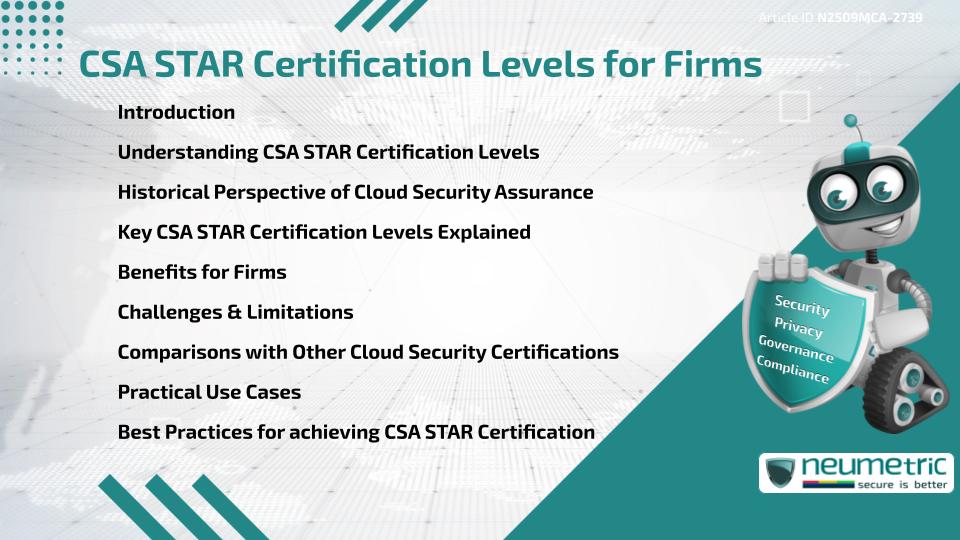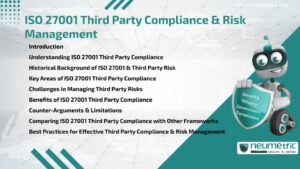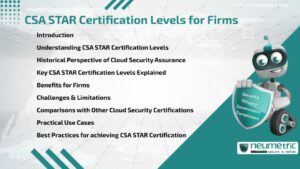Table of Contents
ToggleIntroduction
CSA STAR Certification levels provide Organisations with a Framework to demonstrate transparency, security & compliance in cloud services. Managed by the Cloud Security Alliance [CSA], STAR Certification is recognized globally as a benchmark for Cloud Security assurance. By understanding these levels, firms can showcase commitment to Best Practices, build Client trust & gain a competitive edge. This article explores the history, certification levels, benefits, challenges, comparisons & Best Practices.
Understanding CSA STAR Certification Levels
The CSA STAR Certification levels are part of the Security, Trust, Assurance & Risk [STAR] program. They provide assurance to Customers about a provider’s security practices & controls. These levels combine self-assessments, Third Party audits & Continuous Monitoring, offering flexible pathways for firms of all sizes & maturity levels.
Historical Perspective of Cloud Security Assurance
Cloud adoption brought concerns about Data Protection, compliance & transparency. Early on, firms relied on internal audits or basic Compliance Reports. With rising global demand for standardised assurance, the CSA introduced the STAR program, building on its Cloud Controls Matrix [CCM]. Over time, CSA STAR Certification levels became a trusted industry Framework aligning with international standards such as ISO 27001.
Key CSA STAR Certification Levels Explained
The CSA STAR Framework includes three main levels:
- Level 1: Self-Assessment – Organisations publish a self-Assessment using the Consensus Assessments Initiative Questionnaire [CAIQ] to demonstrate their controls.
- Level 2: Third Party Certification or Attestation – Independent audits validate compliance against CSA’s CCM, often integrated with ISO 27001 or SOC 2.
- Level 3: Continuous Monitoring – The highest level, involving real-time updates & continuous transparency through automated reporting & monitoring.
These levels provide flexibility for Organisations to select an approach matching their maturity & Customer requirements.
Benefits for Firms
Adopting CSA STAR Certification levels benefits firms by:
- Enhancing trust & credibility with Customers
- Demonstrating compliance with Industry Standards
- Differentiating services in competitive markets
- Streamlining procurement processes by meeting Customer assurance needs
- Supporting Continuous Improvement in security practices
Challenges & Limitations
Despite its advantages, pursuing CSA STAR Certification can be resource-intensive. Preparing for audits, maintaining documentation & integrating controls require significant effort. Smaller firms may find higher levels like Continuous Monitoring difficult due to costs & technical requirements. Additionally, aligning with international standards requires expertise & commitment.
Comparisons with Other Cloud Security Certifications
While ISO 27001 & SOC 2 provide strong foundations for Information Security, CSA STAR Certification levels offer additional transparency specific to cloud environments. Unlike ISO 27001, which is broad in scope, CSA STAR focuses on cloud-specific Risks. SOC 2 addresses service controls but lacks the Continuous Monitoring element provided in STAR Level 3.
Practical Use Cases
Firms in technology, Finance & Healthcare sectors frequently pursue CSA STAR Certification levels. Cloud service providers use STAR Level 2 or 3 to reassure clients about security commitments. Enterprises working with Sensitive Data also leverage STAR Certification to meet procurement & Vendor management requirements.
Best Practices for achieving CSA STAR Certification
To successfully achieve certification, firms should:
- Conduct a Gap Analysis against the CSA Cloud Controls Matrix
- Choose the appropriate STAR level based on maturity & Client needs
- Train staff on Cloud Security practices
- Engage qualified Auditors for Level 2 Certifications
- Invest in automation & monitoring for Level 3 compliance
Following these practices ensures smoother Certification journeys & long-term benefits.
Conclusion
CSA STAR Certification levels help firms validate Cloud Security practices, enhance transparency & build lasting Customer Trust. By aligning with these globally recognized standards, Organisations can strengthen compliance & gain a competitive advantage.
Takeaways
- CSA STAR Certification levels include self-Assessment, Third Party certification & Continuous Monitoring.
- They enhance trust, compliance & competitive differentiation.
- Challenges include costs, resource demands & technical complexity.
- Best Practices focus on Gap Analysis, training & phased adoption.
FAQ
What are CSA STAR Certification levels?
They are assurance levels under the Cloud Security Alliance STAR program that validate cloud service security & compliance.
Why are these Certification levels important for firms?
They build trust, demonstrate compliance & differentiate services in the marketplace.
What are the three CSA STAR Certification levels?
Level 1: Self-Assessment, Level 2: Third Party certification & Level 3: Continuous Monitoring.
How do CSA STAR levels compare with ISO 27001 & SOC 2?
CSA STAR is cloud-focused, while ISO 27001 is broader & SOC 2 lacks Continuous Monitoring.
What industries benefit from pursuing CSA STAR certification?
Technology, Finance & Healthcare firms handling Sensitive Data benefit the most.
What challenges are involved in achieving higher levels?
Challenges include costs, technical requirements & ongoing monitoring demands.
Can small firms pursue CSA STAR certification?
Yes, starting with Level 1 self-Assessment provides an accessible entry point.
How can firms prepare for certification?
By performing gap analyses, training staff & selecting appropriate levels based on needs & capabilities.
Need help for Security, Privacy, Governance & VAPT?
Neumetric provides organisations the necessary help to achieve their Cybersecurity, Compliance, Governance, Privacy, Certifications & Pentesting needs.
Organisations & Businesses, specifically those which provide SaaS & AI Solutions in the Fintech, BFSI & other regulated sectors, usually need a Cybersecurity Partner for meeting & maintaining the ongoing Security & Privacy needs & requirements of their Enterprise Clients & Privacy conscious Customers.
SOC 2, ISO 27001, ISO 42001, NIST, HIPAA, HECVAT, EU GDPR are some of the Frameworks that are served by Fusion – a SaaS, multimodular, multitenant, centralised, automated, Cybersecurity & Compliance Management system.
Neumetric also provides Expert Services for technical security which covers VAPT for Web Applications, APIs, iOS & Android Mobile Apps, Security Testing for AWS & other Cloud Environments & Cloud Infrastructure & other similar scopes.
Reach out to us by Email or filling out the Contact Form…





